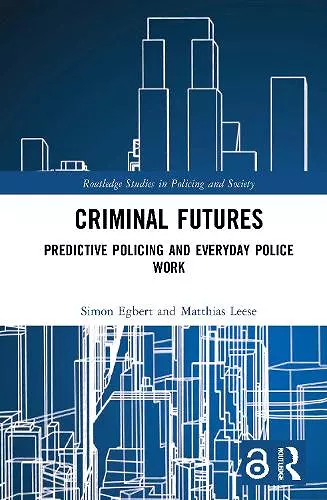Criminal Futures
Predictive Policing and Everyday Police Work
Simon Egbert author Matthias Leese author
Format:Hardback
Publisher:Taylor & Francis Ltd
Published:15th Dec '20
Currently unavailable, our supplier has not provided us a restock date
This hardback is available in another edition too:
- Paperback£40.99(9780367643614)

This book explores how predictive policing transforms police work. Police departments around the world have started to use data-driven applications to produce crime forecasts and intervene into the future through targeted prevention measures. Based on three years of field research in Germany and Switzerland, this book provides a theoretically sophisticated and empirically detailed account of how the police produce and act upon criminal futures as part of their everyday work practices.
The authors argue that predictive policing must not be analyzed as an isolated technological artifact, but as part of a larger sociotechnical system that is embedded in organizational structures and occupational cultures. The book highlights how, for crime prediction software to come to matter and play a role in more efficient and targeted police work, several translation processes are needed to align human and nonhuman actors across different divisions of police work.
Police work is a key function for the production and maintenance of public order, but it can also discriminate, exclude, and violate civil liberties and human rights. When criminal futures come into being in the form of algorithmically produced risk estimates, this can have wide-ranging consequences. Building on empirical findings, the book presents a number of practical recommendations for the prudent use of algorithmic analysis tools in police work that will speak to the protection of civil liberties and human rights as much as they will speak to the professional needs of police organizations.
An accessible and compelling read, this book will appeal to students and scholars of criminology, sociology, and cultural studies as well as to police practitioners and civil liberties advocates, in addition to all those who are interested in how to implement reasonable forms of data-driven policing.
This timely book presents rare ethnographic data within an outstanding analysis of current debates on predictive policing. Conceptualising predictive policing as a sociotechnical system, the book describes various translation processes that lay bare the political, cultural and organisational forces at work. This welcome book sets the standards for future research on data-driven policing.
Janet Chan, Professor, UNSW Law
Wary of simplistic dystopia/utopia dichotomies, Criminal Futures offers a theoretically sophisticated and empirically rich account of predictive policing as a sociotechnical process. This is a landmark study, providing frameworks and analytical tools for understanding - and responding to - the rapid datafication of security that is unfolding.
Dean Wilson, Professor of Criminology, University of Sussex
ISBN: 9780367349264
Dimensions: unknown
Weight: 610g
232 pages